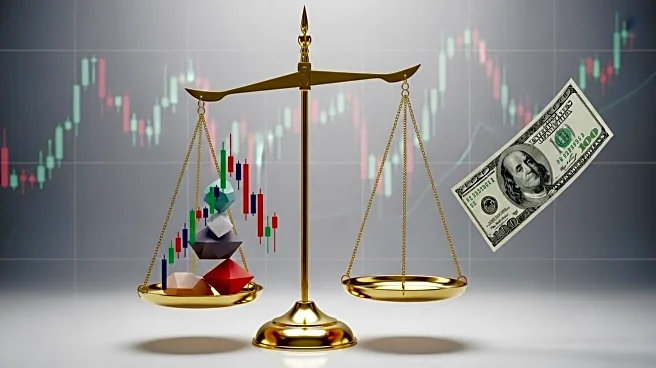What's Happening?
The US dollar has recently shown significant weakness against major currencies such as the euro, British pound, Canadian dollar, and Australian dollar, marking what some analysts describe as its 'worst first half ever.' This decline has sparked fears among investors about the potential negative impact on US assets, with concerns that it could lead to increased import prices and inflation. Despite these worries, historical data suggests that currency fluctuations do not necessarily correlate with stock market performance. Since 1968, US stocks have risen in 44 out of 56 years, regardless of whether the dollar was strong or weak. The current situation is not unique, as similar patterns have been observed in previous years, including during President Trump's first term.
Why It's Important?
The weakening of the US dollar has implications for various economic stakeholders. A weaker dollar can make US exports more competitive internationally but may increase the cost of imported goods, potentially affecting inflation rates. Corporate leaders with global supply chains often hedge against currency fluctuations, mitigating some risks. The broader significance lies in the perception of economic stability and investor confidence. While some fear that a weak dollar could lead to stock market corrections, historical trends suggest that the relationship between currency strength and stock performance is not straightforward. Investors and policymakers must consider these dynamics when assessing economic strategies and potential impacts on the US economy.
What's Next?
Looking ahead, the US dollar's trajectory will likely continue to be influenced by political and economic factors. President Trump's comments on the dollar's strength and his nominee for the Federal Reserve, Stephen Miran, who advocates for dollar weakness, may shape future currency policies. Investors will need to monitor these developments and adjust their strategies accordingly. Additionally, the global economic environment, including trade relations and monetary policies, will play a role in determining the dollar's strength. Stakeholders should remain vigilant and adaptable to potential shifts in currency markets and their implications for US stocks and the broader economy.
Beyond the Headlines
The discussion around the US dollar's weakness also touches on broader economic and political themes. The dollar's role as the world's reserve currency is a point of debate, with some advocating for its reduction in global prominence. This could have long-term implications for international trade and financial systems. Furthermore, the political narrative surrounding currency strength reflects broader economic philosophies and priorities, influencing public policy and international relations. Understanding these deeper implications is crucial for comprehensively assessing the impact of currency fluctuations on the US and global economies.








